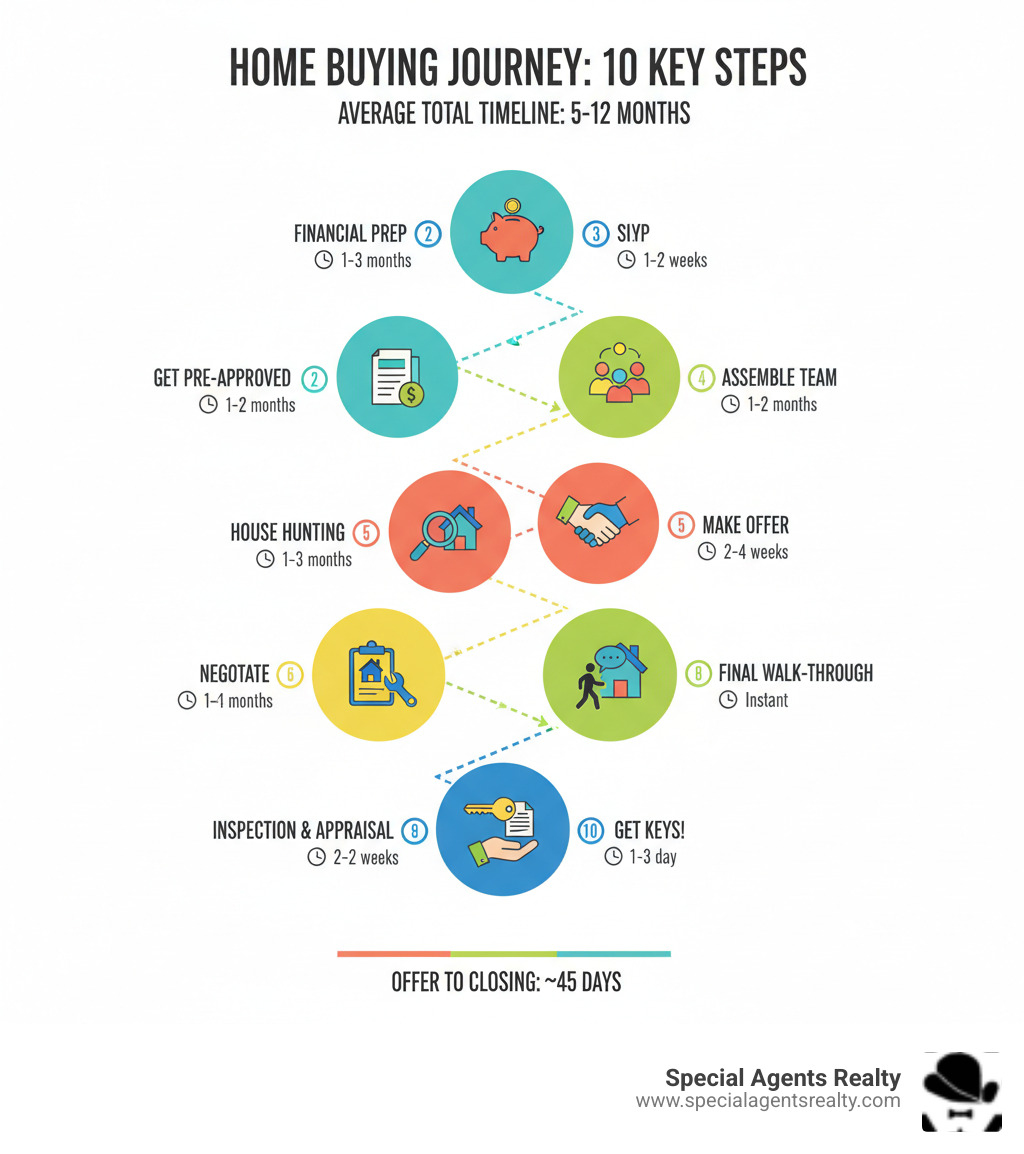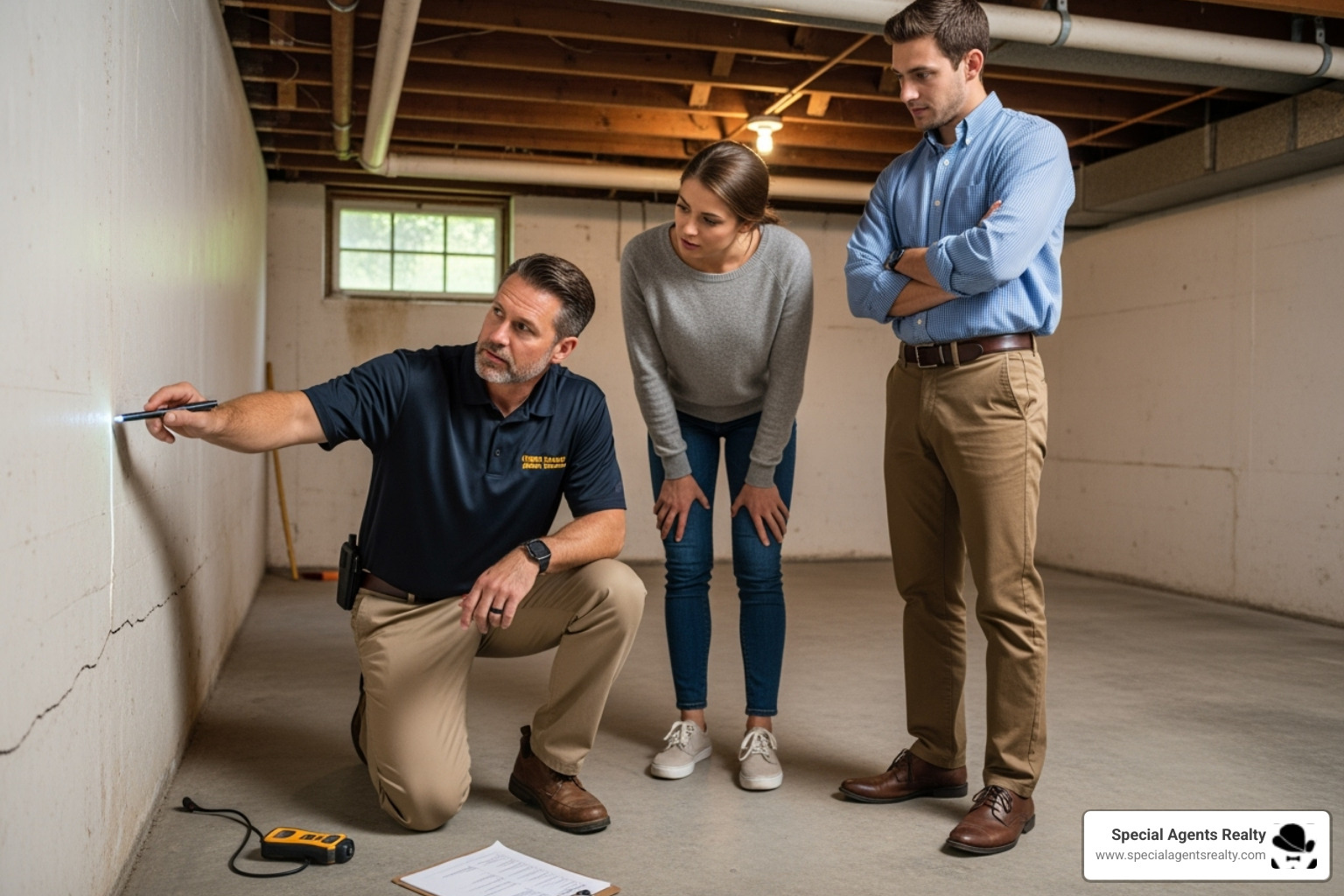
Understanding the Home Buying Process: Your Journey to Homeownership
Buying a residential property is a major financial decision. The process can feel overwhelming, but with the right preparation, it's manageable.
The home buying process follows these key steps:
- Financial Preparation: Save for a down payment (3-20%) and closing costs (3-6% of the loan).
- Get Pre-Approved: Secure mortgage pre-approval to make your offer competitive.
- Assemble Your Team: Find a real estate agent and lender.
- House Hunting: Search for properties that fit your needs and budget.
- Make an Offer: Submit a purchase offer with protective contingencies.
- Home Inspection: Hire a professional to assess the property's condition.
- Appraisal: The lender determines the property's fair market value.
- Negotiate: Request repairs or credits based on inspection and appraisal findings.
- Final Walk-Through: Verify the property's condition before closing.
- Close the Sale: Sign documents, pay costs, and get your keys.
The entire process can take 5-12 months, with about 45 days from offer acceptance to closing. This guide will break down each step, providing a clear roadmap to homeownership.

Step 1: Financial Preparation and Planning
Buying a residential property begins with solid financial preparation. This step is the foundation for a successful purchase.
First, focus on your down payment. While 20% is often cited, many loans require less. Conventional loans can start at 3% down, FHA loans at 3.5%, and VA or USDA loans may require 0% down. A larger down payment reduces your monthly payment and total interest paid. For more details, see our guide on Your Savings and Down Payment.
Next, budget for closing costs, which are fees to finalize your mortgage. These typically range from 3% to 6% of your loan amount and cover expenses like appraisal fees, title insurance, and loan origination fees.
Finally, plan for ongoing homeownership expenses beyond your mortgage. These include property taxes, homeowners insurance, utilities, and maintenance costs. A good rule is to budget 1-2% of your home's value annually for repairs and upkeep.

Determine Your Realistic Budget
To figure out how much house you can afford, start with a home affordability calculator. For a more detailed guideline, many lenders use the 28/36 rule. This suggests your housing costs should not exceed 28% of your gross monthly income, and your total debt (including housing) should not exceed 36% of your gross monthly income. To understand your spending habits, Use this spending tracker to see where your money goes.
Strengthen Your Financial Profile
Lenders focus on your credit score and debt-to-income (DTI) ratio.
Your credit score is crucial. A higher score signals financial responsibility and can secure you a better interest rate. For a conventional loan, you'll typically need a score of at least 620. Learn more about FICO Scores and Your Mortgage. Before applying for a loan, review your credit report for errors using this credit report review checklist.
Your debt-to-income (DTI) ratio compares your monthly debt payments to your gross monthly income. Lenders prefer a DTI under 43%. Paying down existing debt can improve your DTI and loan eligibility. Learn more about What is a debt-to-income ratio?. Taking these financial steps now will put you in a strong position to buy.
Step 2: Assembling Your Team and Getting Pre-Approved
Once your finances are in order, it's time to assemble your team: a real estate agent and a mortgage lender. Before you start house hunting, it's crucial to get mortgage pre-approval. This step strengthens your position as a buyer in a competitive market. Learn more in our guide on Getting a Legitimate Lender and Getting Pre-Approved.

Find and Choose the Right Real Estate Agent
A great real estate agent is your advocate and guide when buying a residential property. You'll want to work with a buyer's agent, who represents your interests exclusively. Their job is to find suitable properties, negotiate on your behalf, and manage the paperwork. You can find More info about using a buyers agent here.
While all REALTORS® are agents, not all agents are REALTORS®. A REALTOR® is a member of the National Association of REALTORS® and adheres to a strict Code of Ethics, which can signify a higher level of professionalism. See the 7 Reasons to Work With a REALTOR®.
To find the right agent, start with personal recommendations from friends and family. Interview at least two or three agents to assess their experience, communication style, and, most importantly, their local market expertise. An agent with deep knowledge of the Northwestern United States real estate market provides invaluable insider information. For more tips, read our article on Finding the Right Agent.
Understand and Secure Mortgage Pre-Approval
Securing mortgage pre-approval is a powerful tool. It's different from pre-qualification, which is just a rough estimate. Pre-approval is a conditional commitment from a lender for a specific loan amount, based on a thorough review of your finances, including your credit report, income, and assets. This commitment is usually valid for 60-90 days.
Pre-approval is crucial because it establishes a realistic budget and shows sellers you are a serious, financially-prepared buyer. In a competitive market, an offer with a pre-approval letter is much stronger and more likely to be accepted.
To get pre-approved, you'll need to provide financial documents like pay stubs, tax returns, and bank statements. Your lender will help you explore different loan types:
- Conventional loans: Typically require a credit score of 620+ and a 3-20% down payment.
- FHA loans: Good for first-time buyers, with credit scores as low as 580 and a 3.5% down payment.
- VA loans: A great benefit for service members and veterans, often requiring 0% down.
- USDA loans: Offer 0% down for homes in eligible rural areas.
Your lender will guide you to the best loan for your situation. With your team and pre-approval ready, you can begin house hunting.
Step 3: The Hunt, The Offer, and The Agreement
Now for the exciting part of buying a residential property: the house hunt. This is where you explore neighborhoods and tour homes to find the right fit.
Key considerations when buying a residential property
To focus your search, create a needs versus wants list. Needs are your non-negotiables (e.g., number of bedrooms, school district), while wants are desirable features (e.g., a large yard, hardwood floors). This helps you stay grounded.
Key factors to consider include:
- Location: The neighborhood's character, amenities, and commute are vital. In the Northwestern United States, you can choose from the urban energy of Seattle, the waterfront calm of Puget Sound, or the family-friendly suburbs of Kirkland, Bothell, Marysville, and Bremerton.
- School Districts: Good schools are a priority for families and can improve a home's resale value.
- Property Size and Type: Decide between a condo, single-family home, or something unique like a floating home.
- Home Condition: Choose between a move-in ready property or a fixer-upper that fits your budget and timeline.
- Future Resale Value: Consider the property's potential for appreciation as a long-term investment.
Your agent will schedule tours, and you can browse listings via Open Home Search and Search for Homes for Sale. Attending open houses helps you refine what you're looking for.
Crafting and Submitting Your Offer
Once you've found the right home, it's time to make an offer. Your agent's expertise is invaluable here.
Your offer will include several key components:
- Offer Price: Your agent will help you determine a competitive price based on comparable sales, the home's condition, and market demand.
- Contingencies: These are protective clauses. Common ones include an inspection contingency (to check for major issues), an appraisal contingency (to ensure the home is worth the price), and a financing contingency (in case your loan falls through).
- Earnest Money Deposit: This is a good-faith deposit, typically 1% to 3% of the purchase price, held in escrow and applied to your closing costs. You could lose this deposit if you back out for reasons not covered by contingencies.
- Proposed Closing Date: This is the target date for finalizing the sale.
After you submit your offer, the seller can accept, reject, or make a counteroffer. This begins a negotiation process. Once both parties agree on the terms, you'll sign a legally binding purchase agreement.
Step 4: Due Diligence and Negotiations
Once your offer is accepted, you enter the due diligence phase of buying a residential property. This is your opportunity to inspect the property thoroughly and ensure the financing is sound.

The Home Inspection
A professional home inspection is essential. We strongly recommend you Insist on a Home Inspection. A licensed inspector will examine the home's major systems, including the roof, foundation, HVAC, plumbing, and electrical. You'll receive a detailed report outlining any issues.
Your inspection contingency allows you to act on these findings. For significant problems, you can request repairs, ask for seller credits, renegotiate the price, or walk away from the deal.
The Home Appraisal
The appraisal is ordered by your lender to confirm the property's fair market value. A licensed appraiser evaluates the home and compares it to recent sales in the area.
If the appraisal comes in lower than your offer, your appraisal contingency gives you options: ask the seller to lower the price, cover the difference in cash, or potentially exit the contract. Your agent will help you strategize the best approach.
Negotiating Repairs or Credits
Based on the inspection and appraisal, you can negotiate with the seller. Focus on major issues like safety hazards or failing systems, not minor cosmetic flaws.
You can request repairs or ask for seller credits at closing, which gives you control over the work. If issues are extensive, negotiating a price reduction is another option. Your agent will advocate for your best interests during these negotiations.
Step 5: The Final Stretch to Buying a Residential Property
You're approaching the finish line of buying a residential property. This final phase involves several key tasks to ensure a smooth closing.

Preparing for Closing Day
In the weeks leading up to closing, you'll need to:
- Get final mortgage approval: Your lender will re-verify your employment and finances. Avoid making major purchases or opening new credit lines during this time.
- Secure homeowners insurance: Lenders require proof of coverage before finalizing the loan. Shop around for the best policy, considering regional needs if you're in the Northwestern United States.
- Review the Closing Disclosure: You'll receive this document three business days before closing. It details all final loan terms and costs. Compare it to your initial Loan Estimate and ask your lender about any discrepancies. Learn more about Closing and Title Costs.
- Arrange closing funds: Prepare a cashier's check or wire transfer for your down payment and closing costs. Always verbally verify wire instructions with the title company to avoid fraud.
- Understand title insurance: At closing, you'll purchase title insurance to protect against future claims on the property's title. Read more about Understanding Title Insurance.
Use a closing checklist to stay organized.
The Final Walk-Through and Closing
Within 48 hours of closing, you'll conduct a final walk-through. This is to verify that the property is in the agreed-upon condition, all negotiated repairs are complete, and all systems are working. If you find any issues, your agent will address them with the seller immediately.
On closing day, you will sign numerous legal documents at a title company or attorney's office. Key documents include the promissory note (your promise to repay the loan) and the deed of trust (which secures the loan with the property). You will also pay your down payment and closing costs. The title transfer is managed by an escrow company, which acts as a neutral third party. Learn more about The Functions of an Escrow. You can review a guide to closing forms beforehand.
Once all documents are signed and funds are transferred, the new deed is recorded, and you officially become a homeowner. Congratulations, you get the keys to your new home!
Frequently Asked Questions about Buying a Home
Buying a residential property raises many questions. Here are answers to some of the most common ones.
How long does the home buying process typically take?
The entire process generally takes 5 to 12 months. The house hunting phase can vary from a few weeks to several months, depending on your needs and market conditions. Once your offer is accepted, the closing period typically lasts about 45 days. This is when inspections, appraisals, and final loan approval take place. A cash purchase can speed up the timeline, while complications or selling a current home can extend it.
Should I buy or rent a home?
This decision depends on your finances, lifestyle, and long-term goals.
- Buying allows you to build equity, gain stability, and enjoy potential tax benefits. However, it involves high upfront costs, maintenance responsibilities, and less flexibility if you need to move.
- Renting offers flexibility, lower upfront costs, and no maintenance worries. The trade-offs are no equity growth, potential rent increases, and less control over your living space.
If you plan to stay in one place for several years and are financially prepared, buying is often a strong investment. If you value mobility or are not ready for the commitment, renting may be a better fit.
What are common legal pitfalls or scams to avoid?
When buying a residential property, be aware of these common risks:
- Wire Fraud: Scammers send fake emails with fraudulent wiring instructions for closing funds. Always verbally verify wiring instructions with your title company or agent using a trusted phone number before sending money.
- Unclear Titles: A title search and title insurance are crucial for uncovering and protecting you from issues like liens or ownership disputes.
- Hidden Property Defects: A thorough home inspection is your best defense against sellers who fail to disclose known problems with the property.
- Misunderstanding Contingencies: Know your rights and deadlines for inspection, appraisal, and financing contingencies. Missteps can cost you your earnest money.
At Special Agents Realty, we guide clients through these potential pitfalls to ensure a safe and secure transaction. If anything feels suspicious, contact us immediately.
Your Homeownership Journey Starts Here
From financial planning to closing day, buying a residential property is a significant but rewarding journey. Success isn't about luck; it's about preparation, patience, and partnering with the right team of professionals. This guide provides a roadmap, but every journey is unique and deserves personalized attention.
If you're looking to buy in the Northwestern United States—from Seattle to Bremerton, Kirkland to Marysville, or anywhere around Puget Sound—you need a team with deep local knowledge. That's where Special Agents Realty excels.
Our commitment is to provide personal care and expert guidance through every step. We're here to make your home buying experience successful, enjoyable, and memorable. The right home is out there, and we're excited to help you find it.

Ready to start your search? View our current listings to start your search and let's begin this adventure together.
.avif)





